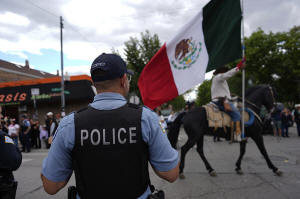Potential federal intervention poses challenges for Chicago police on
the ground
[September 08, 2025]
By
CHRISTINE FERNANDO and CLAUDIA LAUER
CHICAGO (AP) — As President Donald Trump threatens to expand immigration
raids and deploy the National Guard, Chicago has become the latest
flashpoint in a broader national struggle over how far the federal
government can push local authorities to cooperate with its immigration
agenda.
For the Chicago Police Department, the challenge is acute. The force
must preserve public safety in a city already under strain while
avoiding the appearance of working hand-in-hand with federal immigration
authorities, a stance that could erode community trust and ignite new
protests.
The same balancing act has confronted other big-city departments in
recent months. Local police in Los Angeles and Washington, D.C., were
drawn into fraught arrangements with federal agencies that experts say
left residents wary and, at times, undermined public confidence in their
police.
Now, Chicago finds itself on the same path, with Illinois Gov. JB
Pritzker objecting to any National Guard deployment and city officials
bracing for how the added federal presence could reshape the dynamic on
the ground. The outcome, policing experts warn, may determine whether
Chicago police can maintain credibility in immigrant communities likely
to be targeted by a president determined to show force.
“What the Trump administration is doing here is engaging in federal
policing in a way that really rips at the seams of the relationships
between state and local police and the federal government, between
communities and law enforcement,” said Nayna Gupta, policy director at
American Immigration Council. “Those kinds of standoffs and contentious
practices is what erodes public safety.”

Sanctuary city conflicts
Over the course of the Trump administration’s immigration surges,
Chicago officials repeatedly reaffirmed the city's so-called sanctuary
policies that have been place for four decades. But as fear grew about
looming U.S. Immigration and Customs Enforcement actions, the city's
mayor has avoided detail about how local police will navigate tensions
on the ground.
Chicago’s policies bar local law enforcement from asking about or
detaining someone for their immigration status or from supporting ICE,
including by securing perimeters for raids, transporting detainees or
sharing information about undocumented immigrants.
Mayor Brandon Johnson signed an executive order last week declaring city
police would not collaborate with federal immigration agents. It also
requires Chicago officers to wear uniforms and not wear masks to
“clearly distinguish them from federal agents.”
“We will not have our police officers who are working hard every single
day to drive down crime deputized to do traffic stops and checkpoints
for the president,” Johnson said before signing the order.
Craig Futterman, a law professor at the University of Chicago, said any
cooperation between ICE and local officers hurts public trust and blurs
the lines between agencies.
“It can get really messy,” Futterman said. “There’s how sanctuary cities
are supposed to work on paper vs. what happens in practice.”
Caught between protesters and ICE officials
Gupta said Chicago police will have to coordinate with federal agencies
to some degree, even to respond to protests against immigration raids
and detentions.

In the meantime, city officials say they're following a similar strategy
to policing as the one in place around the 2024 Democratic National
Convention, which cost the city about $27 million in officer overtime.
ICE detained at least 10 Chicagoans at an immigration office on June 4,
drawing dozens of protesters and local elected officials to the street
outside. Police didn't originally know it was an immigration action and
left after realizing that, officials said.
[to top of second column]
|

Police watch during the 2025 Pilsen Mexican Independence Day parade
Saturday, Sept. 6, 2025, in Chicago. (AP Photo/Carolyn Kaster)

Some protesters and local elected officials claimed they saw Chicago
officers clearing the way for ICE agents and protecting their
vehicles. Chicago City Council members demanded an internal probe
into officers’ behavior.
Similar tensions played out in California, where hundreds of
protesters clashed with federal immigration authorities in June,
prompting Trump to deploy thousands of National Guard troops to Los
Angeles, despite the objections of local authorities.
Los Angeles police made hundreds of arrests and dispersed
demonstrations, including at locations where ICE agents were
conducting raids.
Sanctuary city policies “don’t mean a local police officer will
stand in between an ICE officer and a non-citizen,” which would be
considered an obstruction of justice, said Rose Cuison-Villazor, a
professor at Rutgers University Law School.
But whether local officers step in if they disagree with federal
agents' interactions with protesters is also uncertain.
“Do they have the power to intervene?" Futterman asked. "These are
really difficult legal questions. It’s a really fraught situation.”
Local police, National Guard interactions not clearly defined
Chuck Wexler, the executive director of the Washington D.C.-based
think tank the Police Executive Research Forum, said local police
leaders are used to working with federal authorities including joint
task forces aimed at terrorism, drugs or organized crime. But if the
National Guard is deployed in Chicago, its role in performing local
policing hasn’t been clearly defined.
On Thursday, the District of Columbia sued to stop President Donald
Trump’s deployment of National Guard during his law enforcement
intervention there.
“As far as the National Guard as police, they have traditionally
assisted in natural disasters, large scale disturbances and aiding
law enforcement in support functions like traffic and crowd
control," Wexler said. "I don’t recall the National Guard being
deployed to deal directly with day-to-day crime issues.”

Chicago Police Superintendent Larry Snelling has asked for more
communication from federal authorities so “we don't have people
running scared and it doesn’t create chaos on our streets.”
In Philadelphia, District Attorney Larry Krasner says the Trump
administration's use of the National Guard is a threat to successful
prosecutions of crime, risking witness statements being thrown out
and evidence suppressed.
“None of these people are trained in evidence gathering procedures,"
Krasner said. "None of them are trained in Miranda warnings. None of
them are trained in Fourth Amendment rights and procedures and
illegal searches and seizures.”
Kenneth Corey, a former department chief with the New York City
Police Department, warned that surging resources like the National
Guard leads to an artificial and often temporary reduction in crime.
“Any time you surge resources like that you are going to see an
immediate reduction in crime because it has a deterrent effect,”
said Corey, who now works at the University of Chicago Crime Lab’s
Policing Leadership Academy.
“But the problem is it’s short-lived. It can’t be sustained. When
they leave, crime returns. You haven’t addressed the root causes of
crime.”
All contents © copyright 2025 Associated Press. All rights reserved |